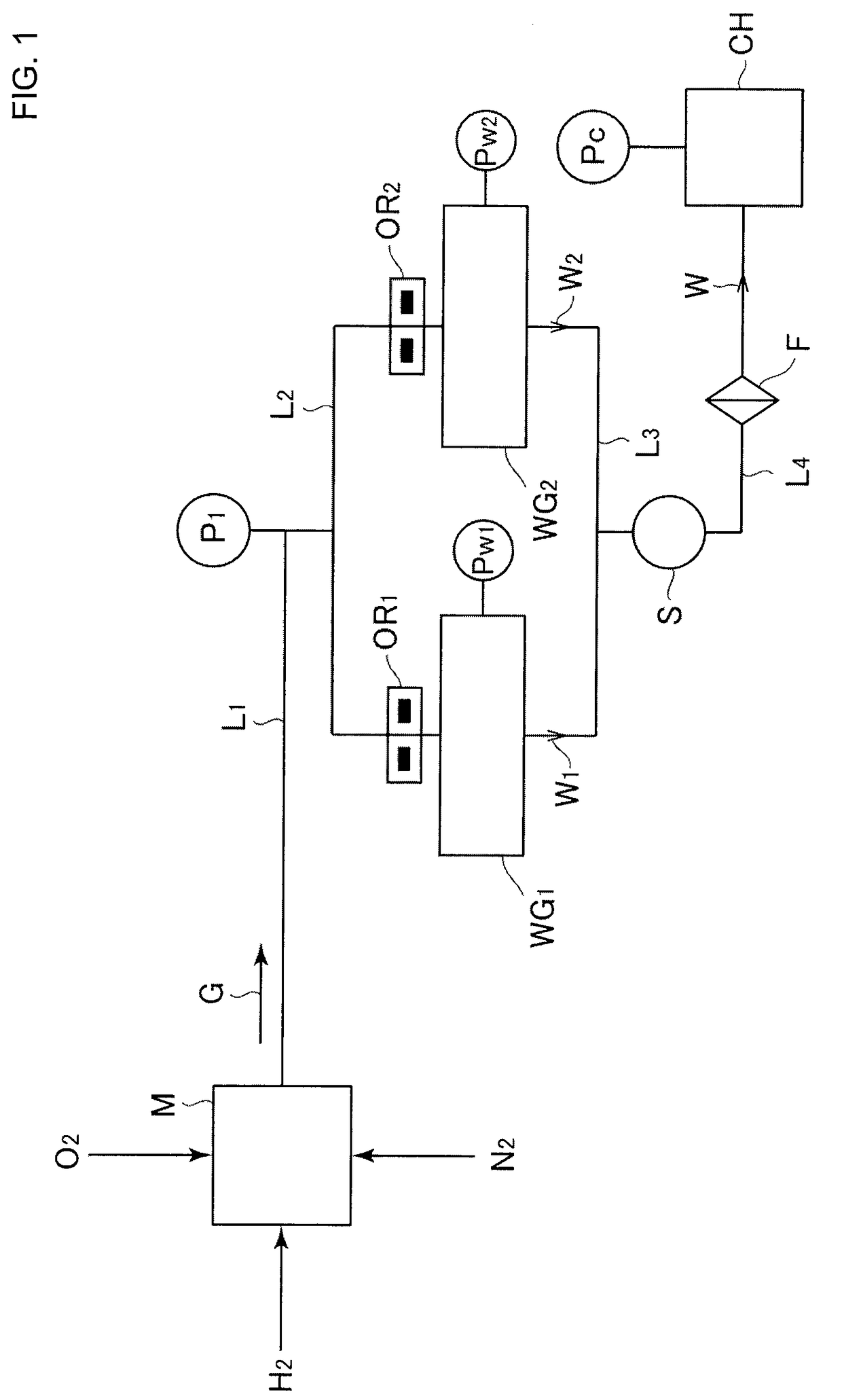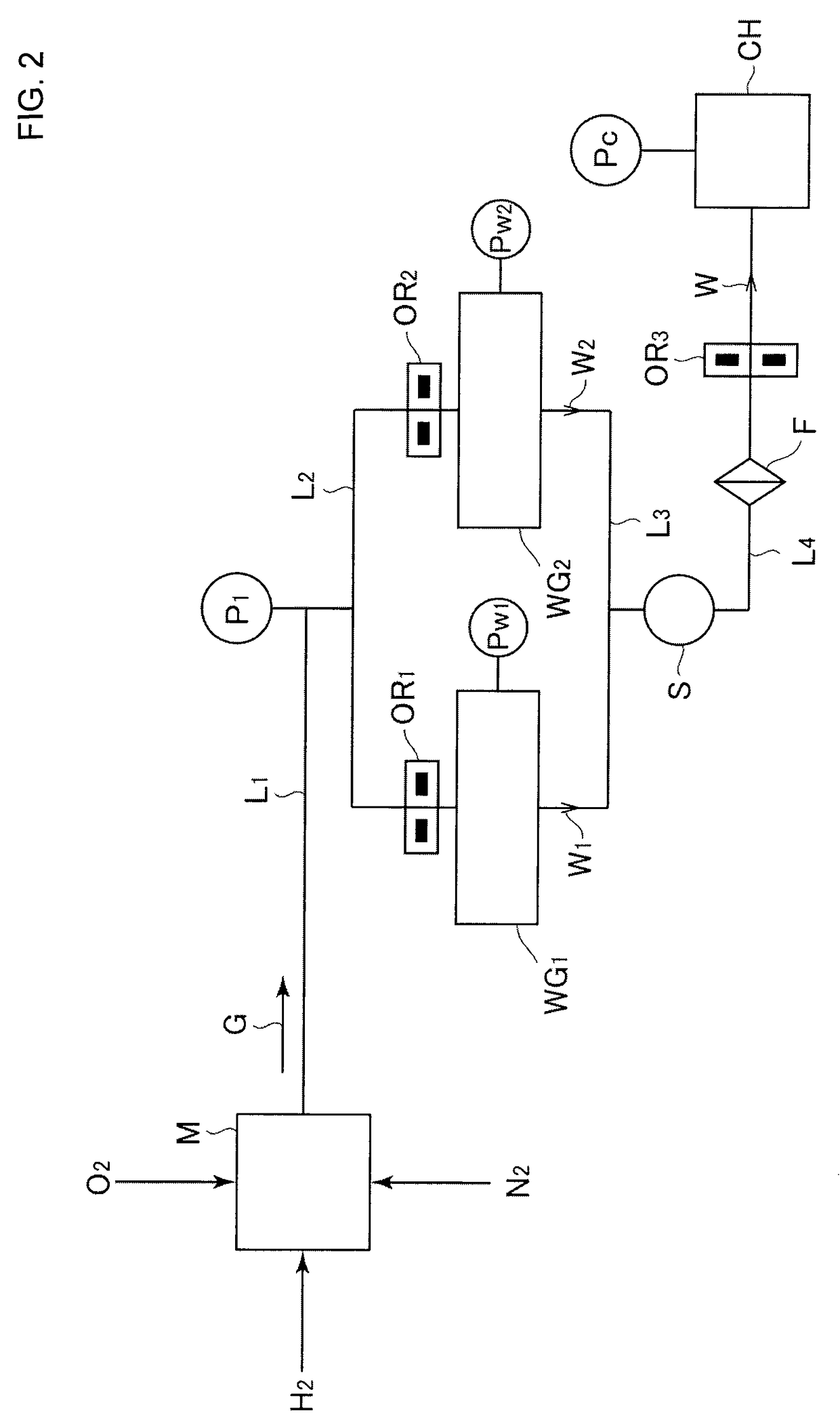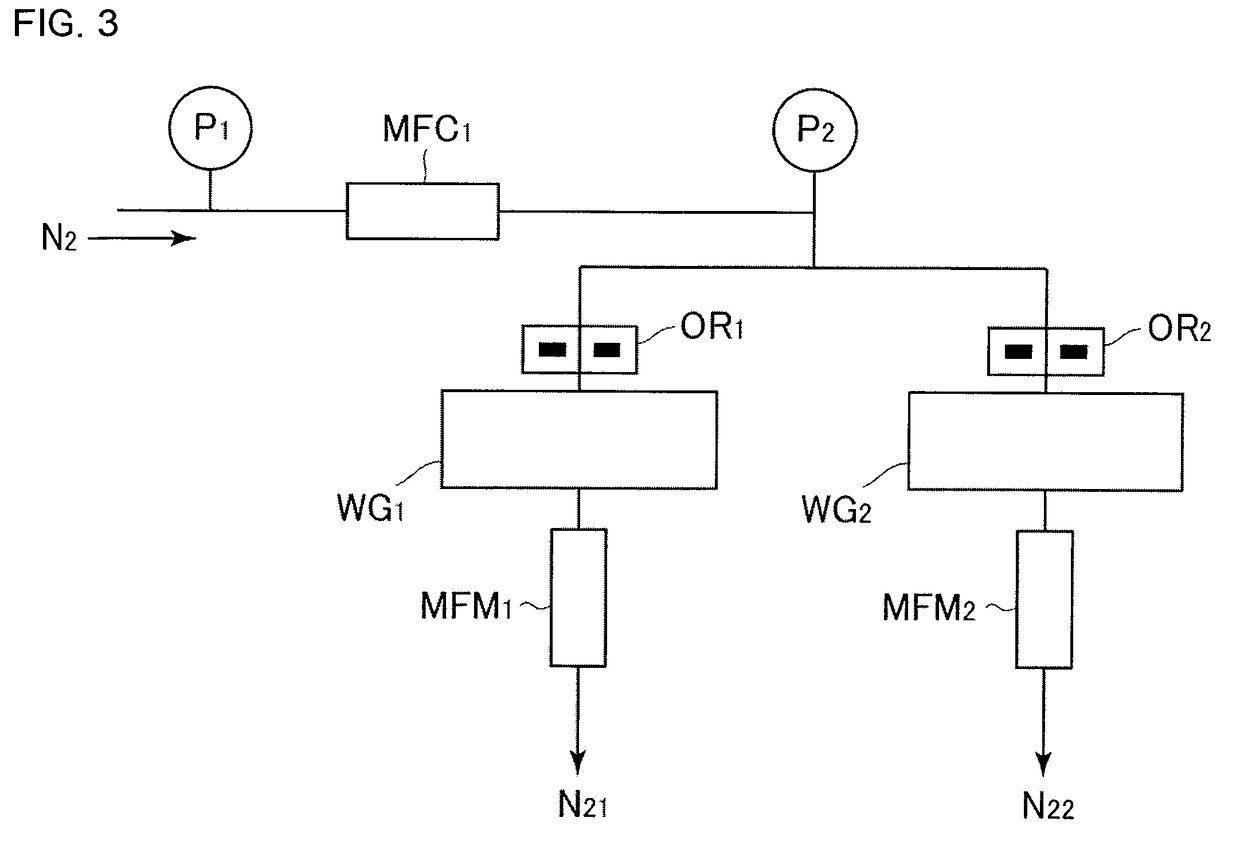Method for parallel operation of reactors that generate moisture
a technology of generating reactors and reactors, which is applied in the direction of water, gas-gas reaction processes, transportation and packaging, etc., can solve the problems of temperature rise, internal temperature rise, and approach, and achieve the effects of reducing cost, extreme accuracy, and safe supply
- Summary
- Abstract
- Description
- Claims
- Application Information
AI Technical Summary
Benefits of technology
Problems solved by technology
Method used
Image
Examples
exemplary embodiment 1
[0081]FIG. 5 is a system diagram wherein 17 SLM moisture gas W is supplied to the chamber CH, which operates under normal pressure (760 Torr), using the two moisture generating reactors WG1 and WG2. Table 5, below, shows orifice upstream-side pressures calculated from the flow rate Q and from the sectional area S on the assumption that a critical condition is established between the upper and lower streams of the orifices OR1 and OR2, shown in the system diagram of FIG. 5.
[0082]Formula (1) is the operational expression of the flow rate Q.
[0083][Formula1]Q=SPHTH·C′·(F.F.)(1)
[0084]In this equation, Formula I, Q is a flow rate of gas, S is an orifice sectional area, TH is a temperature of gas, PH is upstream pressure, C is the constant 187021, and C′ is a correction (C×0.82) calculated from an actual flow rate.
[0085]
TABLE 5SectionalStream belowOrificearea SStream above orificeorificemmmm2kPa absTorrTorr0.650.332202.61519.5759.80.60.283237.71783.4891.70.550.238282.92122.31061.20.50.1...
exemplary embodiment 2
[0086]In the same system diagrammed as that of FIG. 5, pressure P1 and pressure P2 on the upstream side (i.e., tube upstream side) and on the downstream side (i.e., above the orifices OR1 and OR2) of the mass flowmeter MFC have been respectively calculated when mixed gas G consisting of H2 and O2, corresponding to moisture generation of 17 SLM, is allowed to flow. Formulas (2) and (3) are operational expressions therefor.
[0087][Formula2]Q=C(P1-P2)(2)[Formula3]C=π8ηa4l(p1+p22)(3)
In the equations of Formulas (2) and (3), Q is a flow rate of gas, P1 is upstream pressure, P2 is downstream pressure, a is an orifice radius, and η is a viscosity coefficient of the gas. When a tube pressure loss (H2 / O2) is calculated, the viscosity coefficient of mixed gas G cannot be calculated and, hence, a calculation is performed both for H2 and for O2 as shown in Table 6 (the viscosity coefficient η of H2 is 0.88×10−5 Pa·sec, and the viscosity coefficient ζ of O2 is 1.75×10−5 Pa·sec).
[0088...
exemplary embodiment 3
[0089]FIG. 6 is a system diagram showing parallel operation of two moisture generating reactors WG1 and WG2 performed according to the present invention. In FIG. 6, RG1 to RG4 designate pressure regulators, V1 to V4 designate valves, FA1 and FA2 designate cooling fans, HTC1, HTC2, HTC3, and HTC4 designate temperature controllers, and HTM11 and HTM2 designate temperature monitors. The outlet side of each of the moisture generating reactors WG1 and WG2 opens toward the atmosphere.
[0090]The temperature controllers HTC1 and HTC4 are used to keep the temperature of the moisture generating reactors WG1 and WG2 at 350° C., and the cooling fans FA1 and FA2 are controllably operated, if necessary. The temperature controllers HTC2 and HTC3 are used to keep the temperature of the tube lines at 140° C. Each of the orifices OR1 and OR2 is an orifice whose opening diameter is 0.7 mmφ, and each of the moisture generating reactors WG1 and WG2 is a 5 SLM type reactor having an outer diameter of 180 ...
PUM
 Login to View More
Login to View More Abstract
Description
Claims
Application Information
 Login to View More
Login to View More - R&D
- Intellectual Property
- Life Sciences
- Materials
- Tech Scout
- Unparalleled Data Quality
- Higher Quality Content
- 60% Fewer Hallucinations
Browse by: Latest US Patents, China's latest patents, Technical Efficacy Thesaurus, Application Domain, Technology Topic, Popular Technical Reports.
© 2025 PatSnap. All rights reserved.Legal|Privacy policy|Modern Slavery Act Transparency Statement|Sitemap|About US| Contact US: help@patsnap.com



